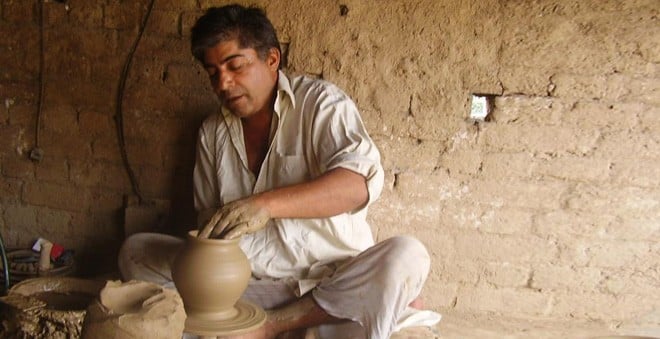
By promoting cottage industry, the government can alleviate poverty by creating employment and increasing exports

The cottage industry is considered the backbone of economy as it plays very important role in the industrial development of a country. The developed countries in Asia such as Japan, Korea, Taiwan, Malaysia and China had started their journey toward economic prosperity from the cottage industry and reached the heights of industrial growth within years. The industrial setups rely heavily on the small-scale industries in these countries even today. The share of small-scale industries in term of creating job opportunities for skilled and unskilled labour is up to 80 per cent in many countries.
According to economists, there is a tremendous potential in Pakistan’s urban as well as rural centres to promote and encourage cottage industry. Pakistan is luckily one of those countries where there is no dearth of sharp and intelligent brains and majority of the population comprises youth. All kinds of skilled workforce is also available from carpet-weaving units to handicrafts manufacturing factories and from shoes-making setups to sports goods manufacturing concerns. Thousands of people, including women, are engaged in carpet-weaving, glass bangles, and embroidery work.
The small-scale industrial sector not only caters to the needs of the local population, but also earns precious foreign exchange. The mushroom growth of small-scale industries at a time in Gujranwala, Gujrat, Sialkot, Karachi, Hyderabad, Lahore, Multan, and Faisalabad created hundreds of thousands of jobs in manufacturing units of auto spare parts, washing machines, fans and other household items without any government assistance.
Though the provincial governments on the occasion struggled their way to harness the human resources by introducing various small-scale industrial schemes, establishing industrial estates and providing easy bank loans to the unemployed youth, it could not reap maximum benefits of the potential available in the country.
The development and encouragement of the cottage industry is also important as it does not require big investment, a very highly qualified staff, or sophisticated technology, but even then it has the potential to extend a full back support to the large scale units.
Pakistan is still struggling to keep up pace with developing countries despite the fact that various Pakistani economists, scientists and businessmen have achieved pinnacles of fame in finance, marketing, social sciences, engineering, technology and many other fields. The cottage industry is trying to stand firm against hostile situations as power outages, terrorism, and political instability have cast negative effects on it in the recent years, leading to the closure of thousands of businesses.
There is a need to resolve various issues faced by the cottage industry, especially in Sialkot and Gujranwala. The small businesses need technical know-how, smooth electricity supply, and a mechanism to ensure the sale of products in foreign markets. The small entrepreneurs need education and training about the export marketing and management as well as export documentation. There is also a dire need to learn the methods adopted by other countries to introduce their products in the world markets.
For instance, China has officially launched an agency to facilitate the foreign buyers to easily locate a product of their need and import it to their respective countries through a simplified procedure. The cottage industry in Pakistan is scattered, incoherent and mismanaged which confuses the foreign buyers to even think about purchasing anything from Pakistan. After the 18th Amendment to the constitution, the responsibilities of the provincial governments have increased and it is their duty to attract investment, protect and facilitate businessmen, and lay down a simple procedure to introduce Pakistani products abroad.
"In Pakistan, a small-scale entrepreneur often faces disdainful behaviour from the official machinery as every government department is apparently hell-bent to create hurdles, especially for the startups," says Shahnawaz Chaudhry, who owns a small marble factory. He adds that instead of getting encouragement and facilitation, the owners of small-scale or home-based industries have to walk on the tight rope of little finances and big problems. "Even banks give little attention to the small-scale businessmen while they go extra-miles in facilitating the mega exporters," he said, adding Pakistan has tremendous potential to earn billions of dollars if it revives the carpet industry.
However, Arsalan Hameed, a retired government officer, says that the cottage industry has been recording a steady growth even during the odd situations since independence. He adds that the government should specifically patronise towel, plastic, and auto spare parts industries instead of encouraging imports of finished products from Malaysia, China, and Taiwan.
"The Pakistani towel is popular all over the world, earning millions of dollars foreign exchange," says Rehmat Ali, who owns a small towel unit. However, he says that the government must ensure made-in-Pakistan sticker on the export products.
Mian Khalid, a senior officer at the Punjab Small Industries Corporation, says the government has introduced various schemes for the cash-strapped entrepreneurs through Punjab Small Industries Corporation and even provided costly industrial lands to the small entrepreneurs at nominal prices. He says that billions of rupees loans have been given to the businessmen in Punjab and other provinces, adding that 2.8 million entrepreneurs benefited from the government schemes in Punjab alone.
However, Ali contradicts the official claims about the loan schemes, saying that no development funds have been allocated for the small-scale units in the province. Ali says that defect lies in poor planning and management at the government level as the officials concerned have failed to understand the rationales of industrialisation. "The government should encourage the establishment of those industries which use local raw material and skilled workforce," he said, adding that this step of the government will not only alleviate financial burden on the government, but will also help reduce unemployment and poverty in the country.